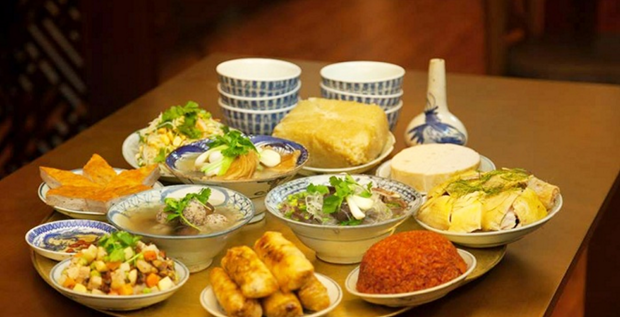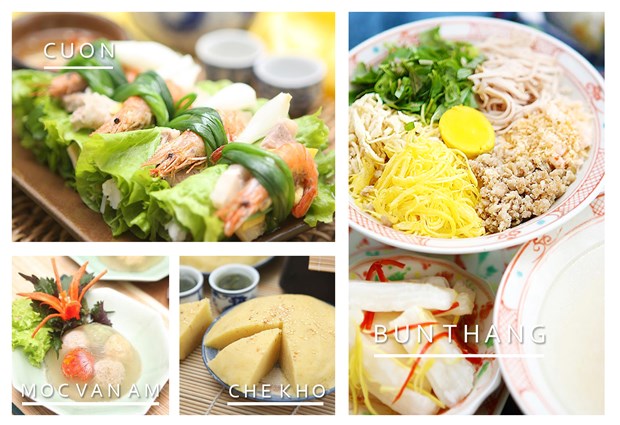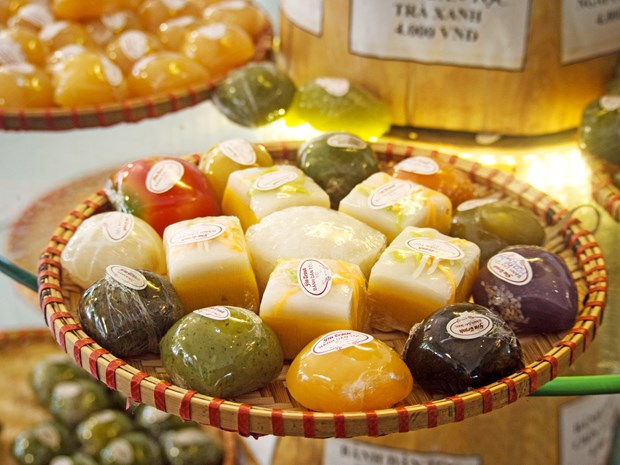A Hanoi native recreates what a family feast for the Lunar New Year looked and tasted like a century ago.

The lost flavors of Tet.
The
last night before Tet, Nguyen Phuong
Hai laid out three bowls of noodle soups, with bamboo shoot and pork meatball.
On the same tray, he magically placed eight other plates of colorful pork,
chicken and glutinous rice variations.
While
a holiday feast is now often greasy and heavy, Hai’s version of a traditional
Hanoi-style Tet dinner is none of
those.
Born
into what he describes as a strictly traditional family, Hai says the right Tet feast, at least according to his
grandmother’s definition, must have “eight plates and eight bowls,” including
seafood luxuries such as abalone, sea cucumber and swim bladder. The dinner
table just needs to exude wealth and happiness.
Then
comes thang cuon, a colorful creation
conjured out of Tet left-overs to
declare the end of sumptuous meat meals.
Hai,
a respected expert on the capital’s traditional cuisine, told us: “The home
cooks of Hanoi had a talent for lifting normal ingredients into sophisticated
delicacies.”
Five-element,
yin-yang cooking
Five
elements and yin-yang principles were vital to the cooking of Hai’s
grandmother, Hoang Kim Thong and her contemporaries.
Grandma
Thong, 93 when she passed away in 2014, used to dye pork meatballs with five
different ingredients to make moc van am, a dish comprising all the colors of
the five elements metal, wood, water, fire and earth.

Tet dishes like these are rarely seen today. Photo courtesy of Nguyen Phuong Hai.
Moc van am has almost disappeared from
Hanoi homes because it demands too much time, a luxury of modern days.
So
has thang cuon — the hot-and-cold
outro to the week-long culinary symphony that abides strictly to yin-yang
rules. The cuon part is a refreshing roll combining prawn, lettuce, pork belly
and herbs. It is served as a cold appetizer to the hot bun thang noodle soup,
which itself is a mixture of flavors: chicken, omelet, dried shrimp, pork
floss, and a quarter of salted duck egg in a sweet broth.
Vu
Bang, Vietnamese proto foodie and writer, described thang cuon as a Tet’s precious offering that was “unbearably
delicious.”
Along
with moc van am and thang cuon, countless of holiday dishes
and desserts have been wiped out because of wars or simply time.
Saving flavors from
the past
“When
fast-paced life gradually stopped Hanoians from spending days to cook and hours
to eat, delicacies served within families cease to exist, unlike pho and bun cha, which thrive on the sidewalks,” Hai said.
This
might change just now.
Pham
Thi Hong Ha, owner of Gia Trinh Bakery at 16A Ly Nam De, said locals now buy
her traditional cakes to have a taste of past holidays.
Ha
spent months with her mother-in-law to master the art of yin-yang baking. “Old
Hanoians used only herbs to add color to their cakes, like sabah snake grass,
mugwort and jasmine,” Ha said.
Her
bakery always reminds customers that “Great cakes come in pairs,” an old
duality principle that is sometimes forgotten.
Meanwhile
Hai is serving lost dishes at a restaurant not far from the Old Quarter.
“From
my grandmother’s heritage, I have resurrected 100 out of 200 dishes. I’m
planning to serve bun thang soon,” he proudly said.
Hai
has also learned to cook with Ha’s mother-in-law.
“My
mom is willing to teach young people who are passionate. But it takes years of
dedication and requires a certain level of cooking,” Ha said.
Looking
at her daughter, who is now doing a PhD, Ha said the cooking tradition cannot
be forced upon the next generation.
“But
when it’s time, I hope my daughter will continue to preserve the family’s
passion.”

A tray of traditional Tet cakes. Photo by VnExpress/Quynh Trang
By Quynh Trang/VnExpress